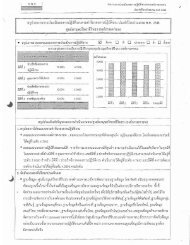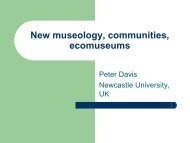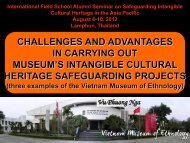Download
Download
Download
Create successful ePaper yourself
Turn your PDF publications into a flip-book with our unique Google optimized e-Paper software.
Today, the photograph “Three Yakama Women” is a partof the Plateau Peoples’ Web Portal, an interactive, onlinedigital archive developed by Washington State Universityin 2008 to provide access to Plateau peoples’ culturalmaterials through collaboration with tribal communities.Members of five tribal nations have the ability to addand curate materials from their own tribes, therebyclaiming space for the voices of source communities andchallenging the widespread valorization of institutionalnarratives of objects and histories. “Three Yakama Women”is now presented in rich detail, enhanced with accountsof tribal knowledgefrom Yakama peoplewho are members ofthe web portal.The PlateauPeoples’ Web Portalwould not exist withoutthe free, open-sourcecommunity archive2“The workshop was part of the SAC’songoing Culture and Rights Forum,with interest in Mukurtu arising asresearchers continue to considerthe roles that source communitiesplay in database development anddissemination.”platform Mukurtu, which enables indigenous communitiesto access and circulate digital cultural heritage materials inways that reflect their own cultural priorities. Recognizingthe potential applicability of Mukurtu to its digital databaseprojects, the Princess Maha Chakri Sirindhorn AnthropologyCenter organized a Mukurtu workshop from the 17th to the18th of December 2012, and SAC staff had the opportunityto learn from and exchange with Dr. Kimberly Christen,Mukurtu Project Director, and Dr. Michael Ashley, MukurtuDevelopment Director. The workshop was part of the SAC’songoing Culture and Rights Forum, with interest in Mukurtuarising as researchers continue to consider the roles thatsource communities play in database development anddissemination.Digital technologies have become so embeddedin daily life that many individuals accustomed to thisseamless integration fail to question the hierarchy ofaccess that determines who can produce and engage withdevices, programs, and content. The Mukurtu programevolved from an effort to address and destabilize thesecategories that shape our understanding of and interactionwith digital platforms such as the internet. In 1995, whenmembers of a Warumungu community in Tennant Creek,Australia started building their own arts and culture center,they achieved the return of many local artifacts that hadbeen housed at national museums across Australia. Inaddition to these physical returns, the community alsoreceived over 700 digitized photographs that were takenby an early missionary to Tennant Creek. Most communitymembers had never seen the images, but upon assessingthe collection, they decided that many photos andthe knowledge surrounding them should not be madeuniversally accessible. Some images contained sacred orsensitive content that necessitated restricted viewership,with only certain kin,gender, or age groupsbeing permitted to seethe images and modifyor contribute relatedcontent.How could thisdigitized collection ofimages be featured atthe arts and culture center without sacrificing the “offline”cultural protocols that influence diffusion of knowledgeand reaffirm positionality and social order within thecommunity? Working alongside Warumungu communitymembers, Dr. Kim Christen began incorporating thesealready-existing community roles and relationshipsinto the digital platform that would become Mukurtu.Each photograph was classified with different levels ofcultural protocols to determine appropriate audience,such as, “restricted community: male AND bird clan.”Every community member has their own username andpassword, and their access level corresponds with theiruser profile, which is determined collectively and set bya system administrator. If a database user’s profile saysthat she is a female member of the snake clan, then thisperson will be able to see and contribute to all “open”content, as well as to all content that is restricted tofemales OR snake clan members, and finally, to all contentthat is restricted to females AND members of the snakeclan. In the Warumungu language, Mukurtu means “dillybag,” or a bag used to hold sacred items. The dilly bagis accessible to members who act responsibly withinthe community and gain the trust and permission ofknowledgeable community leaders. Like the dilly bag,







